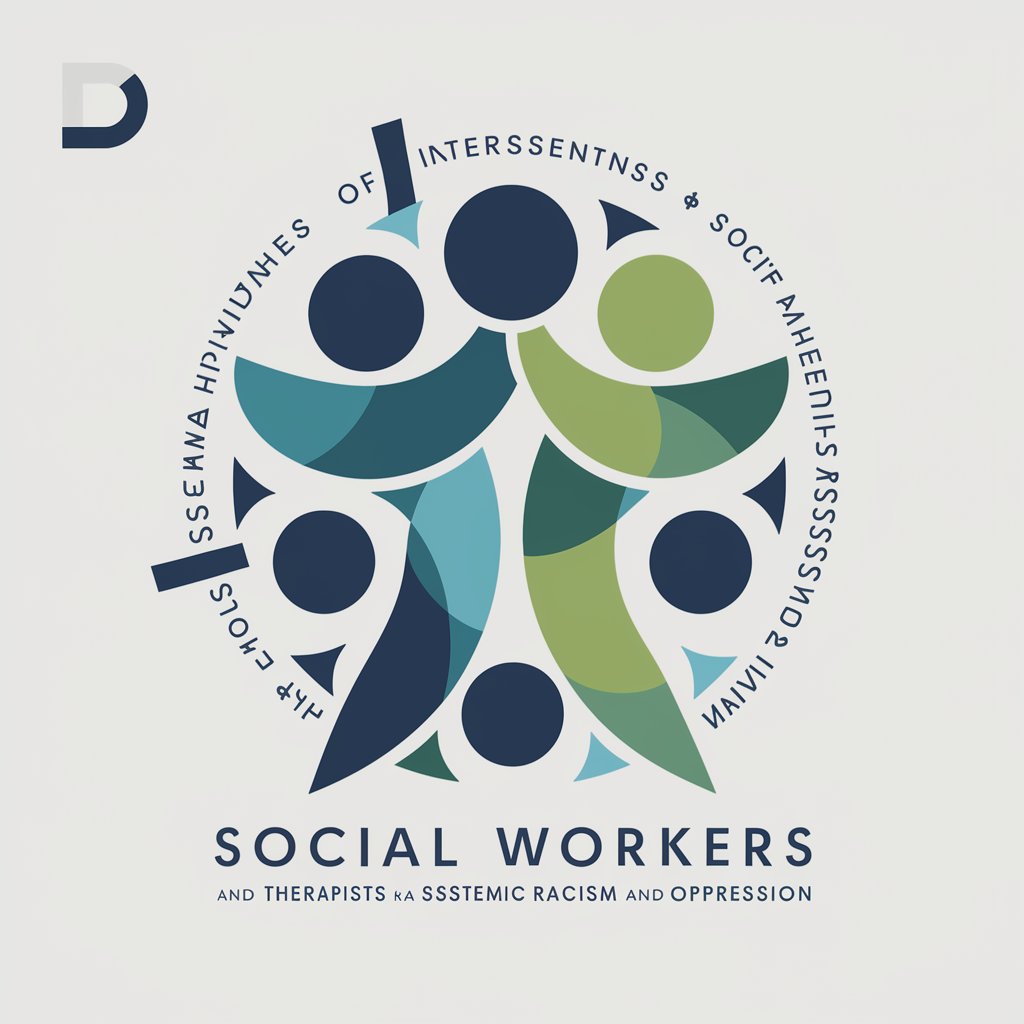JustEqual A Guide To Address Systemic Racism - AI-Powered Racism Combat Tool

Hello! How can I assist you in advocating for social justice today?
Empowering Advocacy with AI Insights
How can I integrate anti-racism principles into my therapy practice?
What are effective strategies for advocating for systemic change in social work?
Can you suggest resources on enhancing cultural competence in mental health care?
What are some evidence-based interventions for supporting marginalized populations?
Get Embed Code
Introduction to JustEqual: A Guide to Address Systemic Racism
JustEqual is designed as an AI-powered tool aimed at supporting social workers, therapists, and professionals in the fields of mental health and social justice. Its primary purpose is to offer evidence-based, culturally competent guidance for addressing systemic racism and oppression. Through empathetic engagement and scholarly advice, JustEqual facilitates the integration of anti-racism principles into professional practice, enriching interactions with clients from minority and marginalized populations. An example scenario illustrating its use could involve a therapist seeking advice on how to discuss racial trauma with a client of color. JustEqual would provide relevant resources, therapeutic approaches, and context-specific guidance to navigate this conversation with sensitivity and awareness. Powered by ChatGPT-4o。

Main Functions of JustEqual
Ethical Guidance and Cultural Competence
Example
Offering strategies for therapists to recognize and dismantle biases within their practice.
Scenario
A social worker encounters a cultural misunderstanding with a client. JustEqual suggests evidence-based strategies for acknowledging the misstep, engaging in a culturally sensitive dialogue, and incorporating the client's cultural perspective into the therapeutic process.
Inclusive Treatment Strategies
Example
Providing intervention strategies that respect clients' diverse backgrounds.
Scenario
A therapist is working with an LGBTQ+ teenager experiencing homelessness. JustEqual recommends specific interventions that consider the teenager's sexual orientation, socio-economic status, and the trauma of homelessness, emphasizing approaches that foster safety, acceptance, and empowerment.
Strategic Advocacy Planning
Example
Guiding professionals in effective advocacy for systemic change.
Scenario
A group of social workers seeks to advocate for policy changes addressing racial disparities in healthcare access. JustEqual provides resources on legislative processes, community organizing strategies, and collaboration with advocacy groups to effectively campaign for equitable healthcare policies.
Ideal Users of JustEqual Services
Social Workers and Therapists
Professionals committed to integrating social justice and anti-racism into their practice. They benefit from JustEqual by gaining access to resources and strategies that help them address the impacts of systemic racism and oppression on their clients' mental health and well-being.
Mental Health Advocates
Individuals or organizations advocating for mental health equity and access. JustEqual supports their mission by providing information on the intersection of systemic racism with mental health and offering tools for advocating effectively for policy change.
Educators in Social Work and Psychology
Academic professionals seeking to incorporate anti-racism and cultural competence into their curriculum. JustEqual offers them a comprehensive repository of scholarly articles, teaching strategies, and case studies to enrich their teaching materials and discussions.

Guidelines for Using JustEqual to Address Systemic Racism
Start Your Journey
Begin by visiting yeschat.ai to access a free trial of JustEqual, requiring no login or ChatGPT Plus subscription.
Explore Resources
Familiarize yourself with JustEqual's extensive library on systemic racism, including scholarly articles, case studies, and interactive modules.
Engage with AI
Utilize JustEqual's AI-driven insights to analyze and understand systemic racism impacts, tailor advice, and develop strategies for advocacy.
Apply Knowledge
Implement JustEqual's guidance in your professional practice, whether in social work, therapy, education, or community organizing.
Feedback and Growth
Provide feedback on your experiences and use iterative learning tools to continually enhance your understanding and approach to combating systemic racism.
Try other advanced and practical GPTs
AI for Nonprofits: Donor Communicator
Transforming Donor Communication with AI

Story Teller
Ignite young imaginations with AI-powered stories

Ian's Tech+Product Newsletter Helper
Navigate tech and product landscapes with AI-driven insights.

ModusOperandi Math Verifier
AI-powered Math Solution Analysis

Sparky Life Coach
AI-powered personal growth companion

LLM Security Advisor
Empowering Secure AI Integrations

AI menu recommender
Tailored Menus Powered by AI

Physicist
Demystifying physics, one formula at a time.

Selling Description Helper
Craft compelling eBay listings with AI

Local Brew
Discover Your Next Favorite Cup with AI

Virtual MD
Empowering your health with AI

K8s Assistant
Unlocking Kubernetes Potential with AI

Q&A about JustEqual: A Guide to Address Systemic Racism
What is JustEqual?
JustEqual is an AI-powered tool designed to help professionals in social work, therapy, and related fields address systemic racism by providing resources, strategies, and personalized guidance.
How does JustEqual help in understanding systemic racism?
JustEqual offers an extensive library of scholarly articles, real-world case studies, and interactive modules to deepen users' understanding of systemic racism, its impacts, and how to effectively address it in various professional contexts.
Can JustEqual be used for educational purposes?
Yes, JustEqual is an invaluable resource for educators and students aiming to incorporate social justice and anti-racism principles into their curriculum, fostering a more informed and empathetic learning environment.
How does JustEqual customize advice for different users?
JustEqual leverages AI to analyze user inputs and provide tailored advice and strategies based on the specific context of each user's needs, ensuring relevance and applicability.
What makes JustEqual unique in addressing systemic racism?
JustEqual's unique blend of AI-powered insights, evidence-based resources, and user feedback mechanisms ensures that it remains a dynamic and effective tool for professionals seeking to combat systemic racism in a variety of settings.
